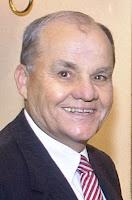
B. Avant Edenfield
How many ways can a federal judge screw up a case before him? Quite a few, it turns out, when the case threatens to expose corruption among fellow members of the legal tribe.
We have written extensively about two federal lawsuits that alleged certain judges and lawyers used a hunting club in Lowndes County, Alabama, as the nexus for a scheme to fix divorce cases. We've shown that federal judges unlawfully dismissed both cases, denying the discovery that probably would have allowed plaintiffs to prove their cases and uncover corruption that has heaped untold harm on Alabama families.
Now we have another example of federal judges botching the hunting-club cases in a way that almost had to be intentional. As often is the case with judges who are both corrupt and arrogant, they violated simple procedures--the kind of stuff that is taught in Law School 101.
Summary judgment is a key hurdle that plaintiffs must clear in almost every lawsuit; it's where a judge determines whether a case presents issues that must go to a trial. One of the fundamentals of the summary-judgment procedure is this: All facts must be viewed in the light most favorable to the non-moving party.
Either side can file a motion for summary judgment, but usually it comes from the defendant--and that makes him the moving party. The plaintiff usually is the non-moving party.
In his opinion on the first hunting-club case, U.S. District Judge B. Avant Edenfield correctly stated the law. (See opinion at the end of this post.) On page 4 of his ruling, Edenfield states:
On summary judgment the Court must view all facts in the light most favorable to the non-moving party. Alabama-Tombigbee Rivers Coalition v. Kempthorne, 477 F. 3d 1250 (11th Cir., 2007; Cooper v. Southern Co., 390 F. 3d 695 (11th Cir., 2004).
So we've established that the judge knew the correct law. Why, then, did he refuse to follow it?
Joseph W. Blackburn, a professor of taxation at Samford University's Cumberland School of Law, alleged in the first hunting-club lawsuit that former Jefferson County Circuit Judge John C. Calhoun engaged in corrupt behavior outside his official capacity, meaning Calhoun was not protected by judicial immunity. (Blackburn represented himself as the lead plaintiff in the first hunting-club case; in the second, he acted as an attorney, representing other victims of alleged corruption in Alabama divorce courts).
Blackburn's position is summarized on page 23 of Edenfield's ruling:
Plaintiff at most has alleged that [Calhoun] acted with corrupt (bribed) motives when he ruled against him and his proposed co-plaintiffs. True he has alleged that this defendant has done things off the bench like pal around with corrupt lawyers, soak up illicit "hunting club" (etc.) benefits--all to foster an illegal enterprise.
But those allegations are all "quid-pro-quo-tied" to Calhoun's rulings. Meanwhile, it is settled that damage claims premised upon a judge's adjudicative (as opposed to, for example, administrative) duties are barred by judicial immunity. See, e.g., Mireless v. Waco, 502 U.S. 9 (1991) . . .
Later in the ruling, also on page 23, Edenfield undercuts his own argument and shows that he has violated simple procedural law by ruling against Blackburn:
It is certainly possible to separately classify off-bench conduct (secret meetings at hunting lodges, etc., in furtherance of a RICO enterprise) in order to support a non-immune RICO claim in this context. However, public policy against flood-gate/disgruntlement RICO suits warrants the linkage applied here. . . . Hence, the Court grants defendant Calhoun's motion for summary judgment on these grounds, thus obviating the need to reach his other defenses.
So there you have it, straight from Edenfield's own mouth: It is possible to construe the facts in a way that show Calhoun's off-bench conduct was not protected by judicial immunity.
And what does that mean? As we showed above, Edenfield was required under the rules governing summary judgment to view the facts in a light most favorable to the non-moving party. Edenfield's own words show that the facts could be construed in Blackburn's favor--and, under the law, he was required to find in Blackburn's favor.
So why did he not do it? Our guess is that it was for the same reason he denied discovery--even though clear procedural and case law shows that summary judgment cannot be considered, much less granted, without discovery. (See Snook v. Trust Company of Georgia, 859 So. 2d 865, 11th Cir., 1988.)
And what was that reason? Too many American judges, at both the federal and state levels, are more interested in protecting their corrupt legal brethren than in administering justice.
Edenfield, by the way, was appointed to the federal bench by President Jimmy Carter. That tells us that judicial corruption is not a matter of left vs. right or Republican vs. Democrat. The No. 1 loyalty for judges and lawyers is to the legal tribe--not to a political ideology, not to the law, and certainly not to the cause of justice. If that means providing cover for even the most corrupt members of the tribe, so be it.
That's what Edenfield did in the hunting-club case. And it explains why we need massive legal reform every bit as much as we need health-care reform.
Blackburn Calhoun Opinion
